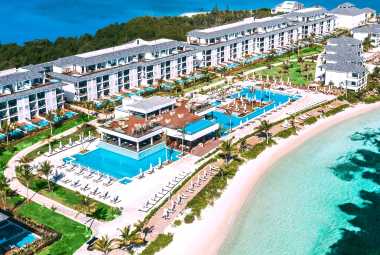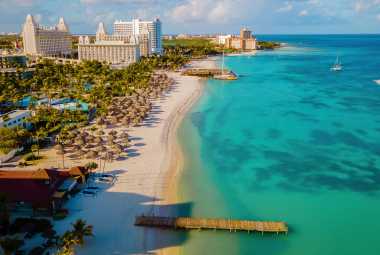Image by outlooktravelmag.com
*Vacation Mode is a for-profit site. It contains paid banner advertisements that are generated and managed by a third-party network. This site also includes relevant affiliate links (both in the content and on the sidebar) all of which we do our best to clearly mark as such.
Quick Summary
- Geography of Vietnam: Diverse landscapes with limestone mountains in the north (Ha Giang, Sapa), stunning coastlines in the central region (Danang, Nha Trang), and the Mekong Delta in the south. Cities like Hanoi and Hoi An blend history, natural beauty, and culture.
- Major Cities:
- Hanoi: Ancient temples, French colonial architecture, Old Quarter.
- Ho Chi Minh City: Dynamic energy, historic sites, nightlife.
- Da Nang: Beautiful beaches, Marble Mountains, Dragon Bridge.
- Natural Landscapes: Mountains with rugged charm, national parks with diverse ecosystems, off-the-beaten-path locations offer untouched beauty.
- History of Vietnam: Over 2,000 years of history, influenced by China, India, and Southeast Asia. Significant events include colonial period under French rule and the Vietnam War.
- Major Events in History: Vietnam War, Cu Chi Tunnels, ancient city of Hoi An.
- Cultural Background: Blends indigenous traditions with foreign influences. Key values include filial piety, respect for elders, and connection to nature.
- Economy of Vietnam: Dynamic and diverse, driven by manufacturing, technology, agriculture, and tourism. Government initiatives improve infrastructure and business environment.
- Major Industries: Manufacturing (electronics, textiles, footwear), agriculture, technology advancements, tourism as key revenue generator.
- Currency: Vietnamese Dong, important for practical transactions. Tips on currency exchange and importance of carrying cash in smaller denominations.
- Popular Tourist Destinations: Ha Long Bay, Hanoi's Old Quarter, Hoi An, Mekong Delta, Ho Chi Minh City, Cu Chi Tunnels, Sapa.
- Best Beaches: Nha Trang, Phu Quoc Island, Doc Let Beach, Con Dao Islands.
- Must-Visit Historical Sites: Temple of Literature, UNESCO World Heritage Site of Halong Bay, Imperial City of Hue, Vietnam War Remnants Museum.
- Traditional Foods: Famous for fresh herbs, spices, pho, spring rolls, bun cha. Emphasis on sweet, sour, salty, and spicy flavors.
- Must-Try Dishes: Pho, banh mi sandwiches.
- Popular Drinks: Vietnamese coffee, sugarcane juice, "Tra Da" (iced tea), "Nuoc Mia" (sugarcane juice).
- Customs and Traditions: Focus on etiquette, respect, community values. Influences from Confucianism and Buddhism.
- Major Holidays and Festivals: Mid-Autumn Festival, Tet Nguyen Dan (Lunar New Year).
- FAQs: Best places to visit (Ha Long Bay, Hoi An, Ho Chi Minh City, Hue), currency (Vietnamese Dong, USD acceptance), weather (tropical monsoon climate), must-try dishes (pho, banh mi), visa requirements, transportation options.
Are you curious about the geography, history, economy, and culture of Vietnam? Wondering about the major cities, natural landscapes, and traditional foods of this vibrant country? Look no further!
In this comprehensive article, we will answer the most commonly asked questions about Vietnam, including its major events, popular tourist destinations, and customs and traditions.
So sit back, relax, and get ready to explore the fascinating world of Vietnam!
What is the Geography of Vietnam?
Vietnam, located in Southeast Asia, boasts diverse geography that includes stunning destinations for travelers to explore and enjoy.
Its landscape features towering limestone mountains in the north, such as in Ha Giang and Sapa, offering breathtaking views for trekking enthusiasts.
The central region allures visitors with its stunning coastline along places like Danang and Nha Trang, perfect for beach lovers and water sports enthusiasts.
Moving south, the Mekong Delta showcases a network of rivers and canals, providing a unique perspective on local life and cultural experiences.
From the bustling streets of Hanoi to the ancient streets of Hoi An, Vietnam's charm lies in its blend of history, natural beauty, and vibrant culture.
What are the Major Cities in Vietnam?
Vietnam is home to vibrant cities that blend modern amenities with rich cultural heritage, offering visitors a glimpse into the local way of life and historical landmarks.
-
Hanoi, the capital city, boasts a fascinating mix of ancient temples, bustling markets, and French colonial architecture, such as the iconic Hanoi Opera House. Visitors can explore the maze-like streets of the Old Quarter, sampling local delicacies like pho and banh mi along the way.
-
Ho Chi Minh City, formerly known as Saigon, captivates with its dynamic energy, from the historic Reunification Palace to the pulsating nightlife of Bui Vien Street.
-
Da Nang, a coastal gem, lures travelers with its stunning beaches, Marble Mountains, and the majestic Dragon Bridge that breathes fire at night.
What are the Natural Landscapes of Vietnam?
Vietnam's natural landscapes offer a mesmerizing blend of beauty and serenity, from lush forests and pristine beaches to hidden gems off the beaten path.
Exploring the mountains in Vietnam reveals a rugged charm that captivates both adventure seekers and nature lovers alike. The towering peaks shrouded in mist create a mystical allure, inviting travelers to embark on unforgettable journeys. The national parks dotted throughout the country boast diverse ecosystems teeming with unique flora and fauna, providing a glimpse into Vietnam's rich biodiversity.
Delving into these lesser-known locations allows visitors to experience the untouched beauty of the land, away from the crowds of more popular tourist spots.
What is the History of Vietnam?
The history of Vietnam is rich and complex, weaving together a tapestry of culture, traditions, and insights that shape the country's identity and heritage.
From its origins as an ancient civilization dating back over 2,000 years to its colonial period under French rule in the 19th century, Vietnam's history is marked by a series of significant events. The country's struggle for independence, culminating in the famous Vietnam War, played a crucial role in shaping its modern identity.
Vietnamese culture reflects a blend of indigenous traditions with influences from China, India, and Southeast Asia, evident in its vibrant art, cuisine, music, and festivals. Traditional values such as filial piety, respect for elders, and a deep connection to nature continue to guide Vietnamese society, illustrating the enduring legacy of its historical journey.
What are the Major Events in Vietnam's History?
Throughout its history, Vietnam has been marked by significant events that have shaped the nation's identity, leaving behind landmarks that offer valuable insights into its past.
- One of the pivotal events in Vietnam's history is the Vietnam War, which had a profound impact on the country's development.
- The Cu Chi Tunnels in Ho Chi Minh City stand as a stark reminder of the war's past, showcasing the ingenuity of the Vietnamese people in navigating through difficult times.
- The ancient city of Hoi An, with its blend of architectural styles influenced by various cultural movements, provides a taste of Vietnam's rich historical heritage.
These landmarks and sites serve as windows to Vietnam's past, reflecting the resilience and spirit of its people.
What is the Cultural Background of Vietnam?
Vietnam's cultural background is a colorful mosaic of traditions, rituals, and customs that reflect the daily lives and values of its diverse population.
These customs, deeply rooted in history, play a pivotal role in shaping the social interactions and behaviors of individuals within Vietnamese society.
From traditional ceremonies like Tet (Lunar New Year) to age-old practices such as the art of water puppetry, these cultural elements bridge the past with the present, instilling a sense of identity and belonging among locals.
The reverence for ancestors, communal harmony, and respect for nature are key values that guide the everyday lives of Vietnamese people, underscoring the importance of heritage preservation for future generations.
What is the Economy of Vietnam?
Vietnam's economy is dynamic and diverse, driven by thriving industries and a stable currency that supports practical business operations and financial transactions.
The major industries in Vietnam that contribute significantly to its economic growth include manufacturing, technology, agriculture, and tourism. These sectors have been instrumental in attracting foreign investments and driving the country's export-oriented growth strategy. The Vietnamese government's initiatives to improve infrastructure and enhance the business environment have also played a key role in attracting investors.
With a gradual opening up of the market and favorable trade agreements, Vietnam offers abundant investment opportunities for both domestic and international businesses looking to establish a presence in Southeast Asia.
What are the Major Industries in Vietnam?
Vietnam's economy thrives on a diverse range of industries, encompassing manufacturing, agriculture, technology, and services that offer valuable insights into the nation's economic prowess and potential.
These industries play a vital role in shaping Vietnam's economic landscape. Manufacturing, particularly in electronics, textiles, and footwear, has significantly contributed to the country's GDP.
Agriculture remains a crucial sector, employing a large percentage of the population and driving rural development.
The rapid advancements in technology have led to innovative solutions and boosted productivity across various industries.
In the services sector, tourism has emerged as a key revenue generator, attracting tourists from around the globe.
Expert analysis indicates a promising future for Vietnam's economy with the continuous growth of these key industries.
What is the Currency of Vietnam?
The official currency of Vietnam is the Vietnamese Dong, which plays a vital role in facilitating practical transactions for both locals and tourists exploring the country.
While traveling in Vietnam, it is important to familiarize yourself with the denominations of the Vietnamese Dong. The Dong comes in banknotes of various values, ranging from the low denomination 1,000 Dong note up to the highest denomination 500,000 Dong note.
Understanding the exchange rates can also help you manage your budget effectively. When exchanging currency, opt for reputable exchange services to avoid scams and ensure you receive fair rates.
Many businesses in Vietnam prefer cash transactions, so carrying Dong in smaller denominations can be convenient for daily purchases such as food, transportation, and souvenirs.
What are the Popular Tourist Destinations in Vietnam?
Vietnam is renowned for its captivating tourist destinations that offer a perfect blend of cultural attractions, natural wonders, and historical landmarks for visitors to explore and enjoy.
From the stunning limestone formations of Ha Long Bay to the bustling streets of Hanoi's Old Quarter, there is something for every type of traveler in Vietnam. One cannot miss the ancient town of Hoi An, with its charming lantern-lit streets and vibrant markets, or the serene beauty of the Mekong Delta. Ho Chi Minh City, formerly known as Saigon, showcases a unique mix of French colonial architecture and modern sky-rise buildings. The Cu Chi Tunnels provide a glimpse into Vietnam's wartime history, while the rice terraces of Sapa offer breathtaking panoramas. These destinations combine rich culture, delicious cuisine, and warm hospitality, making Vietnam a top choice for globetrotters.
What are the Best Beaches in Vietnam?
Vietnam boasts some of the most breathtaking beaches in Southeast Asia, offering pristine shorelines, crystal-clear waters, and a perfect seaside escape for travelers seeking relaxation and exploration.
From the bustling shores of Nha Trang to the tranquil beauty of Phu Quoc Island, Vietnam's coastline presents a diverse array of beach experiences. Nha Trang is popular for its vibrant atmosphere and water sports like snorkeling and diving, while Phu Quoc Island beckons with its serene coves and lush landscapes. For those craving off-the-beaten-path adventures, hidden gems like Doc Let Beach and Con Dao Islands offer secluded retreats. Beachfront accommodations range from luxurious resorts to charming homestays, ensuring visitors can fully immerse themselves in Vietnam's coastal charm.
What are the Must-Visit Historical Sites in Vietnam?
Vietnam's historical sites are a testament to the country's rich heritage and cultural legacy, offering visitors profound insights into its past through iconic landmarks and archaeological treasures.
From the majestic Temple of Literature in Hanoi, which dates back to the 11th century as Vietnam's first university, to the stunning UNESCO World Heritage Site of Halong Bay with its mystical limestone karsts, each site represents a chapter in Vietnam's captivating history.
The Imperial City of Hue stands as a tribute to the Nguyen Dynasty, while the Vietnam War Remnants Museum in Ho Chi Minh City serves as a poignant reminder of the nation's tumultuous past. Exploring these sites provides a deep understanding of Vietnam's resilience, creativity, and enduring cultural traditions.
What are the Traditional Foods in Vietnam?
Vietnamese cuisine is celebrated worldwide for its vibrant flavors, fresh ingredients, and diverse array of traditional dishes that capture the essence of local culinary traditions.
The use of fresh herbs like Vietnamese mint, cilantro, and lemongrass, along with distinctive spices such as star anise, turmeric, and ginger, play a crucial role in elevating the flavors of Vietnamese dishes.
From the iconic pho, a flavorful noodle soup usually made with beef or chicken, to the delicate spring rolls filled with shrimp, herbs, and vermicelli, each dish reflects the harmony of sweet, sour, salty, and spicy flavors that define Vietnamese cuisine.
Regional specialties like bun cha, a dish of grilled pork served with rice noodles and herbs, showcase the diverse culinary landscape across Vietnam.
What are the Must-Try Dishes in Vietnam?
Vietnam offers a gastronomic journey like no other, with must-try dishes that showcase the country's culinary diversity and authentic flavors, satisfying the palates of food enthusiasts worldwide.
From the bustling streets of Hanoi to the vibrant markets of Ho Chi Minh City, Vietnamese cuisine is a tantalizing blend of aromatic herbs, fresh vegetables, succulent meats, and bold spices.
One must delve into the iconic pho, a steaming bowl of fragrant broth infused with tender noodles and sliced beef, topped with vibrant herbs and crispy bean sprouts, creating a symphony of flavors.
The banh mi sandwiches, with their crusty baguette filled with savory meats, pickled veggies, and zesty sauces, are a testament to the fusion of French and Vietnamese culinary influences.
What are the Popular Drinks in Vietnam?
Vietnam's beverage culture is as diverse as its cuisine, offering a refreshing array of popular drinks that reflect the country's traditions, flavors, and social rituals.
- From the iconic Vietnamese coffee with its strong flavors and unique brewing methods to the refreshing sugarcane juice commonly found on bustling street corners, every sip in Vietnam tells a story.
- Traditional beverages like "Tra Da" (iced tea) and "Nuoc Mia" (sugarcane juice) are not just drinks; they are a part of Vietnamese identity and hospitality.
Whether enjoying a glass of "Che" (sweet dessert soup) with friends or indulging in a glass of "Tra Chanh" (iced lemon tea) as a pick-me-up, each beverage embodies the warmth and friendliness of Vietnamese culture.
What are the Customs and Traditions in Vietnam?
Vietnam's customs and traditions reflect a deep-rooted sense of etiquette, respect, and community values that shape interactions among locals and visitors to the country.
These values are evident in various aspects of Vietnamese culture, such as the emphasis on showing respect to elders through gestures like bowing and addressing them with appropriate titles.
Hospitality plays a significant role in daily life, with hosts often going above and beyond to make guests feel welcome and comfortable.
Building strong interpersonal relationships is highly valued, with communication characterized by politeness, indirectness, and a focus on harmony.
Traditional beliefs, influenced by Confucianism and Buddhism, further reinforce the importance of maintaining social harmony and honoring ancestors through rituals and ceremonies.
What are the Major Holidays and Festivals in Vietnam?
Vietnam's calendar is brimming with vibrant holidays and festive celebrations that offer a glimpse into the country's rich cultural heritage, local customs, and traditional rituals.
From the colorful lantern-lit streets of the Mid-Autumn Festival to the jubilant Tet Nguyen Dan (Lunar New Year) celebrations, each event in Vietnam is steeped in tradition and symbolism. The Mid-Autumn Festival, or Tet Trung Thu, sees families coming together to enjoy mooncakes and watch lion dances, while Tet Nguyen Dan marks the arrival of spring with elaborate feasts, firecrackers, and the giving of lucky money envelopes. During these festivities, the spirit of unity and community shines brightly, emphasizing the importance of family, gratitude, and renewal in Vietnamese culture.
Frequently Asked Questions
What are the best places to visit in Vietnam?
There are many amazing places to visit in Vietnam, but some of the best include Ha Long Bay, Hoi An, Ho Chi Minh City, and Hue. Each of these destinations offers a unique and unforgettable experience, from stunning natural landscapes to rich cultural heritage.
What is the currency used in Vietnam?
The official currency of Vietnam is the Vietnamese dong (VND). However, US dollars are also widely accepted in tourist areas and some businesses may even list prices in both dong and USD. It's always a good idea to have some dong on hand for smaller purchases, while larger expenses can be paid in USD.
What is the weather like in Vietnam?
The climate in Vietnam varies depending on the region, but overall it is a tropical monsoon climate with high temperatures and humidity. The north experiences four distinct seasons, while the south has a more consistent hot and humid climate. The best time to visit is typically from November to April, when the weather is cooler and drier.
What are some must-try Vietnamese dishes?
Vietnamese cuisine is known for its fresh, flavorful and healthy dishes. Some popular dishes to try include pho (noodle soup), banh mi (sandwich), bun cha (grilled pork and noodles), and banh xeo (savory crepes). Don't forget to also try some local street food, such as banh mi thit (stuffed baguette) and fresh spring rolls.
Do I need a visa to travel to Vietnam?
Most visitors to Vietnam will need a visa to enter the country. However, citizens of certain countries can enter Vietnam for a limited time without a visa. It's important to check with the Vietnamese embassy or consulate in your country to determine the specific visa requirements for your nationality.
What is the best way to get around Vietnam?
There are several transportation options for getting around Vietnam, including trains, buses, taxis, and motorbikes. Each has its pros and cons, but overall the best way to get around will depend on your budget, comfort level, and desired destinations. It's always a good idea to research and plan your transportation ahead of time to ensure a smooth and efficient trip.


















